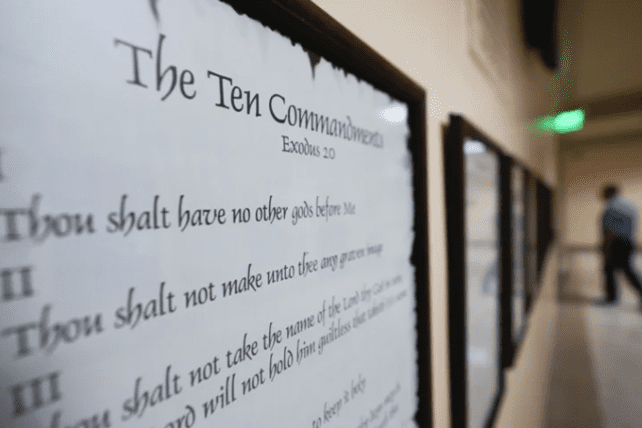As debate over the Texas chaplains bill heated up last year, one Democratic lawmaker in particular — Rep. James Talarico, a Presbyterian seminarian — emerged as someone who opposed the bill on both legal and religious grounds. During debate on the House floor, he expressed concerns that NSCA’s parent organization, Mission Generation, appeared to have advocated for proselytizing to children in schools.
“I see this as part of a troubling trend across the country of Christian nationalists attempting to take over our democracy and attempting to take over my religion — both of which I find deeply offensive,” Talarico told Religion News Service in an interview last year, referring to the chaplains bill and efforts to pass a Ten Commandments bill in Texas.
Republican lawmakers did not amend the chaplains bill to bar proselytizing or impose credentialing requirements for chaplains, leaving it up to individual school districts to outline parameters themselves.
The National School Chaplain Association is referenced by name in the text of Pennsylvania’s school chaplains bill, which was introduced in April. It defines a “certified school chaplain” as “an individual certified by the National School Chaplain Association or other similar organization.” The NSCA was also mentioned in committee discussions in Nebraska.
And where the chaplains bills have become law, criticism has been a constant — especially from religious groups. In March, a coalition of religious organizations signed a letter condemning efforts to install public school chaplains as “greatly flawed” and as threatening “the well-being, education, and religious freedom of our students.” Signers of the letter included entire Christian denominations, such as the Alliance of Baptists, Cooperative Baptist Fellowship, United Church of Christ as well as other religious groups such as the Union for Reform Judaism and the Unitarian Universalist Association. Religious advocacy groups, such as the Muslim Public Affairs Council, Hindus for Human Rights, The Sikh Coalition and Baptist Joint Committee for Religious Liberty, also signed the letter.
In Texas, as school boards across the state gathered in recent months to vote on whether to allow chaplains in their regions, faith leaders regularly appeared to voice disapproval, and more than 100 chaplains signed a petition arguing religious counselors in public classrooms would be “harmful” to students.
In their letter, chaplains decried the absence of standards or training requirements for school chaplains in the bill aside from background checks. They pointed to military chaplains or those who work in health care as a point of comparison, noting requirements like extensive training and instruction on how to work across multiple faiths — conditions absent from the Texas law.
“Because of our training and experience, we know that chaplains are not a replacement for school counselors or safety measures in our public schools, and we urge you to reject this flawed policy option: It is harmful to our public schools and the students and families they serve,” the letter reads.
Proponents of the new slate of faith-focused bills appear confident the courts will back them — especially the current conservative-leaning Supreme Court. Louisiana Gov. Jeff Landry declared at a GOP fundraiser that he “can’t wait to be sued” over the state’s Ten Commandments bill, and Walters of Oklahoma — who has accused Biden, a Catholic, of wanting to destroy “our Christian faith” — told PBS he was unconcerned about legal challenges to his Bible directive because justices appointed by Donald Trump would back him.
“If we get sued and we get challenged, we will be victorious, because the Supreme Court justices (Trump) appointed actually are originalists that look at the Constitution and not what some left-wing professor said about the Constitution,” he said.

